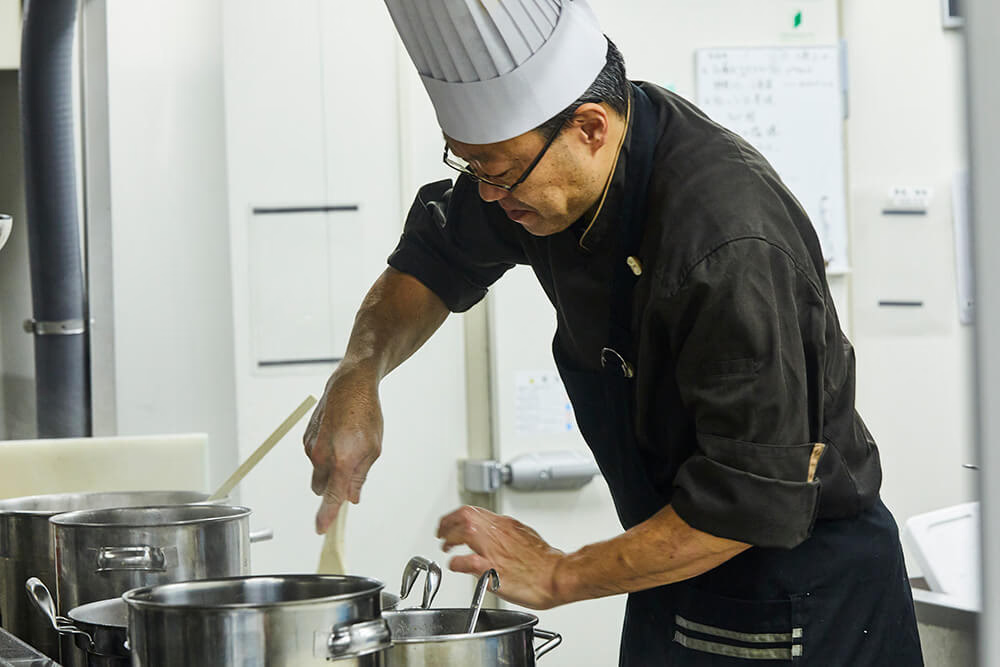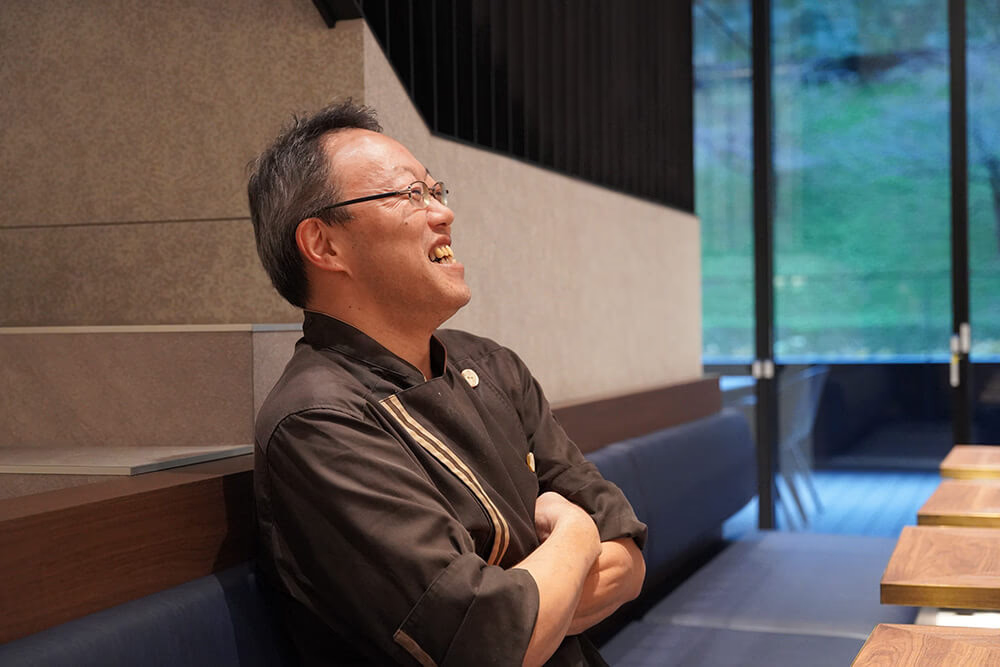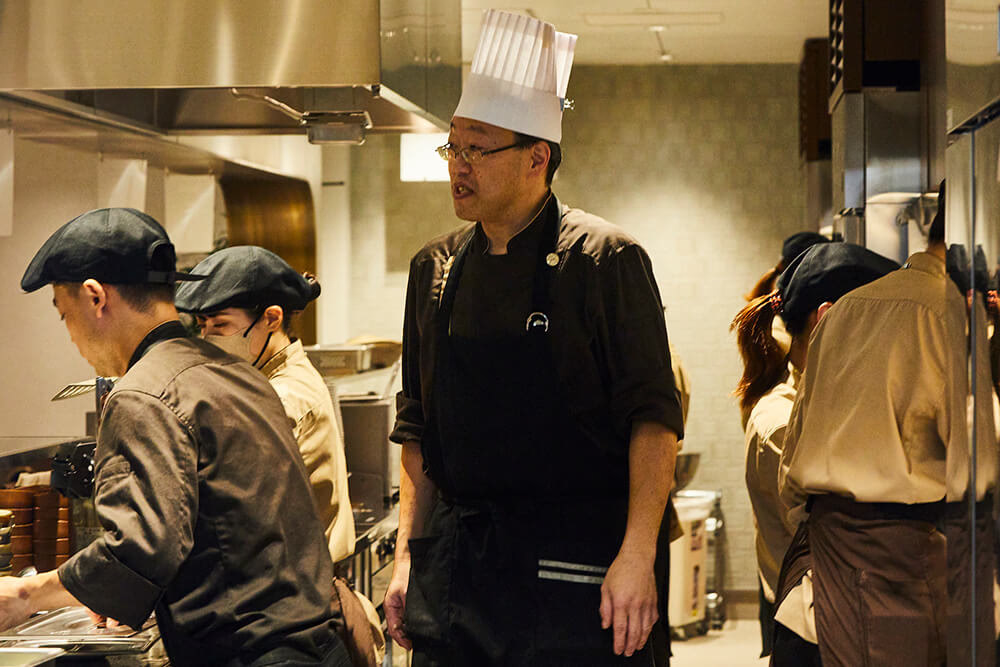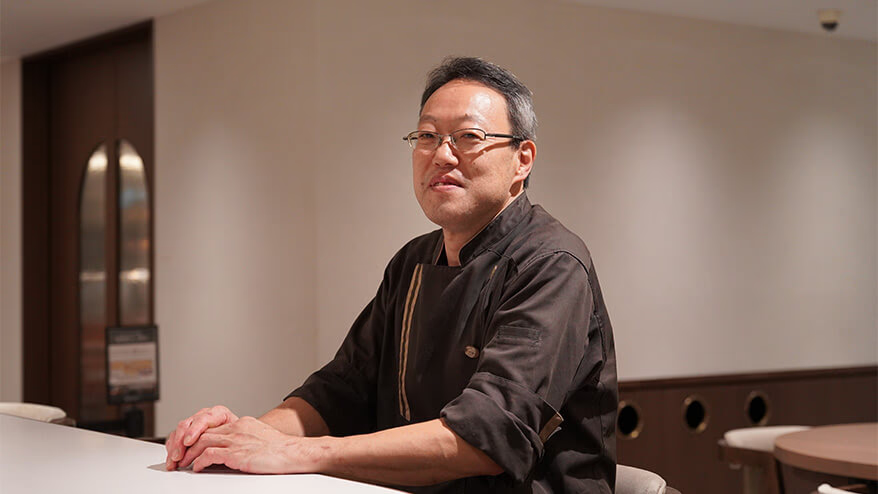Hello, I'm Sugimoto, a writer living in Kyoto.
With autumn's appetite in full swing, we finally managed to interview Iino Naoki, executive chef at MONOSUS Shokken .
The location of the interview was " Kudan-Shokudo for the Public Good," which Iino helped launch and is currently serving as head chef. Since October 2022, it has been run by MONOSUS Shokuken as a "public restaurant open to the local community, focusing on organic, locally-sourced ingredients from small farms across Japan."
It was 3 p.m. and the cafeteria had closed and the kitchen had started to settle down.
In front of me and Yamada Maki-chan, who were waiting with coffee in hand, Iino-san appeared with his usual smile and an air of "I worked up a good sweat." At that time, we had no idea that we would be at the mercy of Iino-san's fascinating storytelling.
Her favorite food is "bread" and her least favorite food is "green peas."
Sugimoto : Actually, there's one question I've always wanted to ask chefs: What was the first food you fell in love with?
Iino : Well... When I was asked what my favorite food was in kindergarten, I wrote "white bread" (laughs). My parents were embarrassed because they thought I might not be feeding them anything decent. I like bread, and I liked white bread because it changes depending on what you put on it.
Sugimoto: I feel that your desire to add your own touch to the food shows that you are a talented chef. Were there any foods that you didn't like?
Iino : If anything, there were too many things I didn't like when I was a child. When I moved from Mitaka to Tokorozawa in the third grade of elementary school, the delicious school lunches were replaced by school lunches provided at a school lunch center. After that, I became the kind of person who would stay up all day eating even during recess.
Sugimoto : Did you dislike the seasoning?
To overcome my dislike of green peas and the taste I like the most, I would sneak into a bread bag and then act as the incinerator attendant and burn them (laughs).
Sugimoto : What a schemer! When was the first time you cooked?
Iino : I never had any intention of becoming a chef, so I would just boil instant noodles in a pot and cut up some cabbage and put it in for lunch. My mother was a good cook, and my father was a chef for the company's cafeteria. My mother's cooking was quite elaborate and everything was delicious, so I didn't have anything in particular to look forward to. I ate everything that was served to me. However, she would complain that she didn't like green peas, so they were not served at home. I still don't like them.
 Iino-san cooking in the kitchen of Kudan Shokudo. It's hard to imagine him as an 18-year-old with no experience...!
Iino-san cooking in the kitchen of Kudan Shokudo. It's hard to imagine him as an 18-year-old with no experience...!
I can't live by the manual
Sugimoto: You said you had no intention of becoming a chef, so why did you decide to pursue a career in cooking?
Iino: When I was a high school student, I was working part-time at KFC when I was asked if I wanted to become a full-time employee. I had received a job offer and a salary offer, but I turned it down two weeks before I was to start work. "I can't live by the manual." I didn't want to be able to express myself because I thought I would have to cook the way I was told all the time. But I had to get a job, and I didn't have anything in particular that I wanted to do, so I vaguely thought maybe I'd become a chef. When I asked my father, "Is it still possible to start in time?" he said, "Yes, I'll talk to you about it." I got a job at the company where my father worked. The first place I was assigned to was the university cafeteria.
Sugimoto :So you jumped straight into the field with absolutely no experience.
Iino : Yes. I had barely even held a knife, except for roughly chopping cabbage. I went to a one-day trial at a culinary school, and I thought I would be doing cooking the whole time, but there was also classroom learning. I couldn't stay awake for a 50-minute class in high school, so I thought I couldn't do a 90-minute class. When I asked my father, "Is there any difference in the treatment of culinary school graduates and high school graduates?" he said, "We don't place any special importance on people who graduate from culinary school," so I thought maybe I didn't need to go.
Sugimoto : So you jumped into that world without even knowing if you liked cooking.
Iino : I thought this was the only option for now. What was good about that company was that everything was handmade. I had a variety of experiences in various restaurants. I entered the culinary world vaguely, so I was glad that the first head chef was a very scary and strict person. On the other hand, if I had been taught step by step and gently, I don't think I would have progressed as much as I have. I think being pushed aside and told to "take it as you go" suited me better.
The head chef didn't teach me anything, and even told me how to hold the knife "however I like it." If I couldn't do it when he told me to "do this," he wouldn't let me do anything again. When I tried to see how he seasoned it, he would hide it with his body and not show me. I wanted to be able to do it for him somehow, so I practiced by myself when I got home.
Trained under an unconventional head chef
Didn't you get any training from your father at the Sugimoto household?
Iino : No, I didn't. I predicted, "Soon I'll be asked to do this," and practiced by imitating what the head chef was doing. If he said, "You can do it," then I was recognized. I think the only thing I was taught was how to make kakiage. "Stick your finger in the oil and flatten it out."
The head chef was a really unconventional person. He did karate, so during breaks he would kick me and say it was "sparring." Shortly after I started working there, I cut off my finger with a knife. Then the head chef suddenly brought out some cement and applied it to the wound, saying it would stop the bleeding, and it was the most excruciating pain I'd ever experienced.
Sugimoto : Umm, I wonder if that was a good solution...?

Iino: Well, the bleeding stopped. After we ate and finished preparing, they brought out a bottle of beer and I couldn't go home until I'd finished putting ice in a bowl and mixing it with beer. That's when I got a lecture. Like, "You can't do this, you can't do that." I drank it all in one gulp, so I don't remember much about it. I just wanted to go home (laughs).
Sugimoto : From his perspective, I guess he found it cute that his 18-year-old junior was gritting his teeth and following him.
Iino : Sometimes people would say, "You can take a little nap." I'm not good at taking naps, so I'd end up sleeping for about an hour. Then the preparations would be over, and I'd go into the kitchen and say, "Excuse me," (laughs). That was all I did.
Sugimoto : By the way, was the chef's food delicious?
Iino was a man who could do anything . When there was a night party, he even made sushi. He was skilled and good at his job, so he wasn't unreasonable. When he was in a good mood, he would say to me, "Go buy a Coke" if I was at the flyer at 9am. At that time, I thought, "Today is going to be a peaceful day."
However, because he was that kind of person, he couldn't manage the numbers. A year after I joined, the company cut his salary and he quit. The first time he invited me to a yakiniku restaurant, he told me he was quitting. I thought about quitting too, but he told me, "You stay until you get your chef's license," and I really did quit right after I got my license (laughs).
Deciding to change jobs after finding a magazine on the train luggage rack
Sugimoto : After that, did you work under the next head chef?
Iinoji, the head chef, came and was very kind. I was transferred because I thought, "This is no good, I won't grow like this." After all, everyone there had worked with my father, so they were very kind. I was a bit of a troublemaker, so I was told to go to the cafeteria in the company dormitory, which was like a "problem child detention center." The head chef there had a perm and was the kind of person who would carry a portable shrine in the downtown area, and many of my seniors were scary, so it was fun.
Sugimoto : Why do you want things to be so strict? Do you like tense environments?
Iino : That's how it was when I was young. Strict people make sure there are no mistakes. That being said, I've never raised my juniors the same way, and I'll teach them anything if they ask me. After I got my chef's license and left the company, my father passed away. I was on the train thinking that it was about time to start job hunting, and there was a job information magazine on the luggage rack. You know, in the old days there were all kinds of newspapers and magazines on the luggage rack.
As I was flipping through the pages, I came across a job advertisement for Royal Marriott & SC Co., Ltd. (now Royal Contract Services), a joint venture between Royal Co., Ltd., Sumitomo Corporation, and Marriott International of the United States. I thought, "Wow! What a big company! I want to work there," so I went to the interview, hit it off with the president, and got the job.
Sugimoto: So that kind of dramatic development really does happen. Or rather, this intense story so far has only been going on for about three years, right?
Iino : That's right. About three and a half years. I worked at the Royal Marriott for 12 years, from the age of 21 to 33. The first place I worked was in the employee cafeteria, which served about 600 to 700 meals a day, and the way the head chef swung the frying pan was so artistic that I stole that from him. After that, the head chef came back from France, and when I said, "I want to serve homemade food," he said, "Well, let's change everything," and I was glad that he made all the changes.

I learned a lot from him and he also taught me techniques. He would take me to first-class restaurants every month, saying, "You should cook after knowing the real thing." I would spend tens of thousands of yen every month going out to eat, saying things like, "For mapo tofu, try Chen Kenichi," or, "Let's try the kaiseki course at Kikunoi in Kyoto." But just as I was thinking, "If I stay with him, I'll never be able to leave him," he asked me to become the head chef of the restaurant that had the worst performance in a year, and I thought this was lucky and accepted.
Sugimoto : I guess you like challenges.
Iino : As head chef, I was able to choose ingredients freely and take responsibility for my own work, so I gradually changed the menu to be more homemade. I was a bit cocky, so the company put me in charge of the restaurant alone, but I did what I wanted.
A dense story, relentlessly delivered punch lines. It's too rich to fit into one article! So, we'll continue with the second part . There's a lot more to come, including Iino's way of being a chef, his meeting with Arai Shigeta, the head of MONOSUS Shokuken , and more, so please look forward to it!

